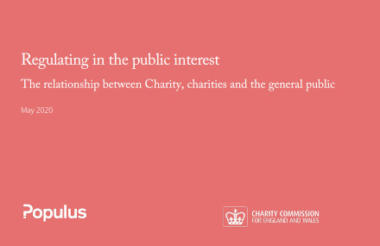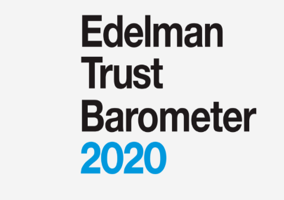Public trust in charities has recovered somewhat, but is not back to where it was in 2014, according to Charity Commission research.
The regulator published Regulating in the Public Interest: The Relationship Between Charity, Charities, and the General Public yesterday, which found that overall trust in charities has reached a score of 6.2 out of 10.
In 2018, the last time the research was carried out, charities scored 5.5, while in 2016 they were at 5.7. The 2014 score was 6.7.
The 2016 survey took place in the wake of high-profile scandals involving fundraising practices and the collapse of Kids Company, and the 2018 survey took place when several international development charities were facing allegations about mishandling serious allegations about the behaviour of staff.
This year’s survey was carried out by Populus in February, just before the impact of the coronavirus pandemic began to felt in the UK. The findings are based on a representative sample of just over 4,000 people.
Charities are now more trusted than the “man/woman on the street” and bankers, who both scored 5.5, but behind doctors and the police, who scored 7.3 and 6.5 respectively.
The report says: “All of this represents a welcome uptick. To continue rebuilding trust and confidence, though, charities need to do a better job of responding to public expectations, not least because they are not alone in being expressions of the nation’s charitable impulses.”
What are the public’s expectations?
According to this year’s report, 79% of the public say it is important to know that a high proportion of money goes to those the charity is trying to help.
Just over half also say that operating ethically is important, and 50% say “making an impact” is important.
The research also finds that 63% of the public think that all charities have a “collective responsibility” to uphold the reputation of the sector.
The report says: “Our qualitative studies clearly suggest that people expect charities to do more to demonstrate that they are operating to high standards as well as making a difference.”
Decline in perceived importance of charities
The percentage of people saying that charities play an “essential” or “very important” role in society has dropped steadily, from 76% in 2012 to 55% this year.
This corresponds with an increase in those who rated charities' importance as “fairly important”, which has risen from 20% to 35% over time.
The Commission also says that its qualitative work has picked up a trend away from larger, established charities: “Some people – particularly among lower security, lower diversity parts of the public – have turned more to giving support directly to worthy local causes (for example by volunteering to help others in their community, or giving food directly to food banks), rather than supporting larger, established charities.
“Others say they are more wary of supporting charities at all.”
Expectations on the regulator
The Commission says that public expectations of it as a regulator are not in line with what it can reasonably carry out.
“It is clear from our continuing consultations with the public and our growing understanding of their attitudes towards charity, that there is a difference between the reasonable expectation the public have about what being a charity registered by the Commission ought to imply and what it actually means under current law,” the report says.
The research says that 53% of the public think that the regulator should “try to make sure charities fulfil their wider responsibilities to society as well as sticking to the letter of the law”.
In an opinion piece for the Times yesterday, Baroness Stowell, chair of the Charity Commission, hinted that she would like to carry out a significant review of the registration process.
She wrote: “Regulating in this environment is not just about finding the most practical way of overseeing the registered charities we have. The charity sector needs to embrace a new generation of organisations with their own ideas for strengthening their communities and wider society.
“The charity register should not be like a private members’ club: difficult to join but offering a place for life once you get in.”
She said it should instead be a “snapshot that captures the vast array of efforts”.
“The Charity Commission will be better equipped to do this if we look again at how we make acquiring registered status possible, as well as what we can do to deprive the wrongdoers and moribund of the status once they have it,” she added.
Related articles













